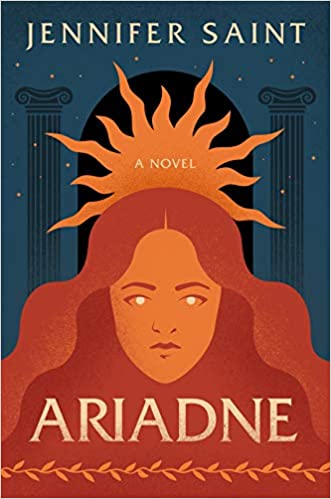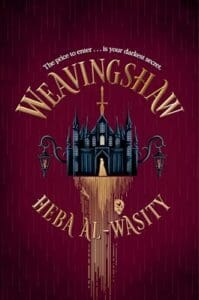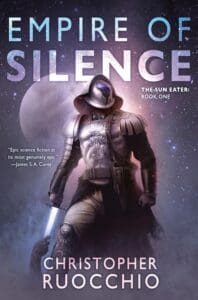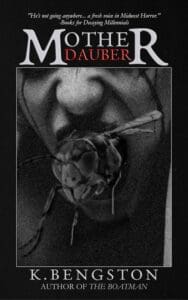My Rating: 10/10
Synopsis:
Ariadne, Princess of Crete, grows up greeting the dawn from her beautiful dancing floor and listening to her nursemaid’s stories of gods and heroes. But beneath her golden palace echo the ever-present hoofbeats of her brother, the Minotaur, a monster who demands blood sacrifice.
When Theseus, Prince of Athens, arrives to vanquish the beast, Ariadne sees in his green eyes not a threat but an escape. Defying the gods, betraying her family and country, and risking everything for love, Ariadne helps Theseus kill the Minotaur. But will Ariadne’s decision ensure her happy ending? And what of Phaedra, the beloved younger sister she leaves behind?
Hypnotic, propulsive, and utterly transporting, Jennifer Saint’s Ariadne forges a new epic, one that puts the forgotten women of Greek mythology back at the heart of the story, as they strive for a better world.
Review:
“I would be Medusa, if it came to it, I resolved. If the gods held me accountable one day for the sins of someone else, if they came for me to punish a man’s actions, I would not hide away like Pasiphae. I would wear that coronets of snakes, and the world would shrink from me instead.”
I was super excited when Amelia, the publicist from Flatiron, reached out and asked if I’d like to join a blog tour for Ariadne. That was a quick and resounding ‘YES’ from me. I love Greek mythology, as some of you might know. Actually, I love mythology in general and Ariadne was no exception. I especially enjoy mythology in the same vein as Madeline Miller, Genevieve Gornichec, and now Jennifer Saint. This idea of taking back the stories of the women in mythology that are often overshadowed by the men is brilliant. The men, who by all accounts, are fuck boys (excuse my language). Oh sure, these men might be some big hero or a mighty god but they generally treat the women around them like disposable objects rather than people. So anything that takes back a little bit of power from them and highlights the women in mythology, rather than treating them like a side note, is right up my alley.
If you’re familiar with Theseus, Ariadne, Dionysus, or Phaedra in Greek Mythology, you’ll know the general outline of where this is headed. Ariadne helps Theseus defeat the Minotaur, he takes all of the glory, and from there it’s a mess. I won’t spoil what happens but let’s just say the fabled hero isn’t always as glorious and noble as the stories proclaim.
“Your flesh would be rotting off your bones if I had no saved you! You are no hero, you faithless coward.”
Ariadne is a testament to female resilience. She learns lessons in love abruptly, harshly at times and slowly, quietly at other times. She becomes a mother and takes joy in a simple life away from the prying eyes of the world. She likes the secluded area she takes up residence in and the life of a homemaker. Phaedra is the opposite; she dreams of grandeur and likes to take charge, she chases her dreams fervently and doesn’t take joy in motherhood. She’d rather be listening to the woes of her people and commanding ships. Women contain multitudes and this is a wonderful example of how two women who share the same blood and upbringing can want two completely different paths in life. Both are okay; there’s humility in living a quiet life and there’s nobility to living a life that serves the world on a larger scale.
When reading modern Greek mythology, there’s one thought that comes to my head and it is about how much it must have sucked living among men like this. Like, men in this time truly were awful and domineering people that treated women like trash. I know, people are going to roll their eyes at this. This isn’t me saying all men suck, but the men in mythology and ancient history often just didn’t respect women. They didn’t feel that their stories were important. I’m glad that we are in a time where we fight back at that and reclaim their history. It’s important to not just see one side of this. This book is full of disastrous and dangerous men. I’m not saying Ariadne is going to make your heart all warm and fuzzy, because men are still the dominant force in the mortal world, but it will at least give you some insight to the women that stood next to them.
“If you had anything that made you proud, that elevated you above your mortal fellows, it seemed to me that the gods would find delight in smashing it to smithereens.”
I think one of the things I find most fascinating about mythology is seeing people live with Gods and Goddesses just walking among them. You could call to Poseidon for vengeance, you could take part in revelry with Dionysus, you had to watch out for jealous Hera, or all-powerful Zeus. It adds a level of unpredictability to the stories that makes them exciting. One thing I really enjoyed about Ariadne is that it connected the dots to a lot of stories I’ve heard in Greek mythology that I didn’t know were intertwined with others stories I’ve heard. It connected marriages, affairs, and tragedies that you hear of but you don’t realize how many of the same people are involved in them. Saint really straightens out some marriages, remarriages, bastard children, affairs (and… trigger warning, rapes) that usually make the Greek lines complicated to follow.
Since this is compared to Circe on the blurb of the book, I think it is worth mentioning if you didn’t enjoy Madeline Miller’s style of writing, be warned that Ariadne might not be your style. Where I adore the lovely prose and dreamy way of retelling these Greek mythologies, other people find that boring. I could never find these novels a bore, but I get that some people seek action and adventure in their retellings. I will say that Jennifer Saint includes a bit more action in her novels and is less prose heavy than Miller, but not by a huge amount. For me, this style of storytelling is absolutely perfect and fills my heart with joy. Saint will be another author that I automatically add to my buy lists because I just click with her writing and the subject.
Thank you again to Flatiron for the opportunity to review Ariadne. I’ve already ordered another copy besides the ARC sent to me and it will sit on my shelves as a favorite.
“The gods do not know love, because they cannot imagine an end to anything they enjoy. Their passions do not burn brightly as a mortal’s passions so, because they can have whatever they desire for the rest of eternity. How could they cherish or treasure anything?”





[…] [Link to full review] […]